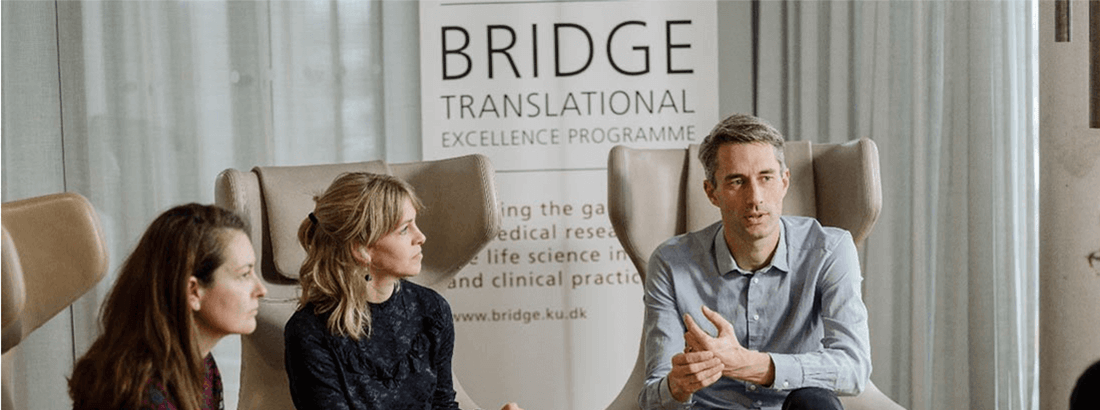Your mentor team

About mentoring
Excellent mentoring is pivotal to succeeding in your BRIDGE Fellowship. The collaboration with your mentor team begins as soon as you plan to apply for a fellowship. The mentor team will take responsibility for your training in the practical aspects, novel technologies and other developments of relevance to your research project.
A mentor team consists of at least two mentors representing basic biomedical science and clinical research and/or life science industry environments. The mentor team will guide you in undertaking your individual translational research project and they will participate in the BRIDGE network, bridging the basic biomedical science and clinically oriented environments.
The labs of the mentor teams will host you in the two-year period of the fellowship and guarantee the necessary running costs to successfully execute your research project, as well as access to support staff, training, equipment and advice from members of the mentors’ respective institutions.
Your mentor team will also mentor you in relation to developing your independent research career, clinical career or a career within the life science industry.
Being a BRIDGE Fellow is a very dynamic thing. You are part of not only one but actually two different research groups.
The industry has a kind of a business mindset which I can incorporate with my research and translational mindset.
How to choose your mentor team and develop the application
A mentor team that suits you
It is highly encouraged to initiate new collaborations when you are creating a mentor team to cooperate with during your BRIDGE Fellowship. A change of environment from your PhD supervisor/laboratory is highly encouraged and considered an investment in your BRIDGE Fellowship as well as in your future career.
When initiating the collaboration with the mentor team, it is important to align expectations on the research project, visions for the outcome of the research project and how the mentor team will be available to you in regards to scientific feedback, career guidance, grant application assistance, etc.
Please note that an appropriate mentor is not necessarily the most senior within their field – the best mentor might be a senior colleague who is prepared and dedicated to share knowledge, experience and advice with you and show support and enthusiasm. Your mentor team should be ready to mentor you in relation to developing your independent research and/or clinical career.
You will meet your mentor team for regular mentor meetings. The scientific progress of your research project will be the focus of these meetings. However, topics relevant to developing your independent research and/or clinical or life science industry career will also be addressed. Examples are fundraising strategy, career planning and curriculum vitae building, project management, staff and student motivation and supervision, network building, handling of competition and conflicts, work/life balance, and formal and informal organisational structures.
Composition of your mentor team
One mentor must represent a basic biomedical science environment at the Faculty of Health and Medical Sciences or Faculty of Science, UCPH. The other mentor must represent a clinically oriented environment at a hospital in the Capital Region of Denmark or Region Zealand or be from the life science industry. Involvement of extra mentors from either academia, the clinical environments or life science industry environments is indeed possible, if relevant.
Please see the official requirements and qualifications for mentors here.
How to find a suitable mentor team
To ensure a successful match between you and a potential mentor team, there are some important things to consider:
- Professional interest alignment can ensure that you and the mentor team will work towards concordant goals
- The mentors’ lab facilities should fulfil your research needs as these labs will be your primary workplace
- Accessibility agreement with the mentors to meet expectations and preferences on the frequency of the meetings, how (in)formal they should be, etc.
- Mentors' plan for your future success as a researcher (career trajectory) should coincide with your own future goals
- Enthusiastic/passionate mentors may help to keep both parties interested in the research project
- A good working relationship will make collaboration easier
Before you decide on a mentor team, you might find it informative to visit the lab facilities made available to you during your research. This would give you the opportunity to see the lab and to speak with future colleagues.
Co-develop your application
Your application to BRIDGE must be co-developed with your mentor team. The co-development of your application will ensure a good alignment of your research plan and management of your research project, including a budget, funding and technical assistance.
The co-development will also strengthen the collaboration between your host environments; the anticipated goals for the two-year period such as output, publications, obtained experience and skills; and the preparation for opportunities to come and future career steps. Please note that if you are invited for an appointment interview, your mentors must be present to do a short team introduction.
